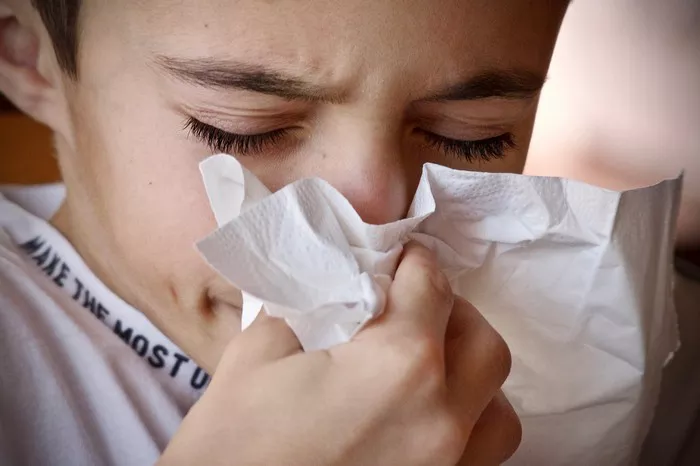Many individuals find themselves pondering a curious phenomenon: why do my allergies get worse when it rains? The intricate interplay between weather patterns and allergic reactions is a subject of keen interest for allergy sufferers. In this comprehensive exploration, we delve into the various factors that contribute to exacerbated allergies during rainy weather, shedding light on the science behind this common occurrence.
The Role of Airborne Allergens: A Precipitation Primer
When raindrops descend from the sky, they bring more than just a refreshing touch to the environment. Rain plays a crucial role in clearing the air of various pollutants and allergens. However, the initial stages of rainfall can have an opposite effect. As raindrops fall, they can stir up and disperse airborne allergens, such as pollen and mold spores, into the atmosphere. This dispersion can create a temporary surge in allergen concentrations, triggering heightened allergic responses in susceptible individuals.
Pollen Predicament: How Rain Influences Pollen Levels
Pollen, a ubiquitous allergen, is a major player in the seasonal allergy landscape. When rain interacts with pollen, it can either provide relief or exacerbate symptoms, depending on the timing and specific circumstances. In some instances, rain acts as a natural cleanser, washing pollen from the air and providing a brief respite for allergy sufferers. However, the period immediately following rain can bring a spike in pollen levels as plants release an increased amount of pollen due to the moisture and improved growing conditions.
Mold Matters: Flourishing in Damp Conditions
Mold spores, another potent allergen, thrive in damp and humid environments. Rainfall creates optimal conditions for mold growth, especially in areas with accumulated moisture. When rain saturates the ground and surfaces, mold spores become active and are released into the air. Individuals allergic to mold may experience a surge in symptoms during and after rainy periods, as these microscopic spores become airborne and permeate the surroundings.
Barometric Pressure Blues: Impact on Sinus Sensitivities
Beyond the direct interaction with allergens, changes in barometric pressure associated with rainy weather can also contribute to worsened allergy symptoms. Barometric pressure refers to the weight of the air in the atmosphere, and fluctuations in this pressure can affect the sinuses. For some individuals, particularly those prone to sinus issues, changes in barometric pressure can lead to sinus headaches, congestion, and exacerbated allergy symptoms. The transition from high to low pressure, often preceding rainfall, may trigger these discomforts.
Indoor Allergens: Rain’s Ripple Effect Inside
While rain may help clear outdoor air temporarily, its effects can extend indoors as well. Moisture from rain can infiltrate buildings, creating favorable conditions for indoor allergens such as dust mites and mold. Individuals spending extended periods indoors during or after rain may find themselves exposed to elevated levels of indoor allergens, contributing to sustained or aggravated allergy symptoms.
Thunderstorm Asthma: A Rare but Serious Phenomenon
In addition to the more common effects of rain on allergies, there exists a rare yet potentially severe occurrence known as thunderstorm asthma. This phenomenon, often associated with specific weather conditions during thunderstorms, involves the release of large amounts of allergenic particles. The combination of strong winds, humidity, and certain types of pollen can lead to the fragmentation of pollen particles into smaller, more respirable pieces. This can result in acute respiratory distress for susceptible individuals, highlighting the complex relationship between weather patterns and respiratory health.
Preventive Measures: Navigating Rain-Related Allergy Challenges
While the intricacies of rain-induced allergies pose challenges, there are proactive measures individuals can adopt to minimize the impact of rainy weather on their symptoms. Here are key strategies to consider:
Monitor Weather Forecasts: Stay informed about upcoming weather conditions, particularly rainfall and changes in pollen levels. Adjust your plans accordingly to minimize exposure during peak allergen times.
Limit Outdoor Activities: During heavy rain or immediately afterward, consider reducing outdoor activities to minimize exposure to airborne allergens. If possible, wait until the environment has had time to settle.
Create an Allergy-Friendly Home: Implement measures to reduce indoor allergens, such as using air purifiers, maintaining low humidity levels, and promptly addressing water leaks to prevent mold growth.
Consult with Healthcare Professionals: If rain-related allergies significantly impact your quality of life, consult with healthcare professionals, including allergists or immunologists. They can provide personalized guidance, recommend allergy testing, and explore appropriate treatment options.
Practice Allergy Management: Adhere to prescribed allergy management strategies, including taking antihistamines, using nasal corticosteroids, and following other medical recommendations. Consistent adherence to your treatment plan can help mitigate the impact of rain-related allergens.
Conclusion
The question of why allergies get worse when it rains encompasses a multifaceted interplay between environmental factors, airborne allergens, and individual sensitivities. By unraveling the complexities of this phenomenon, individuals can empower themselves with knowledge to navigate rainy weather more effectively. Whether through strategic planning, indoor allergen control, or collaboration with healthcare professionals, managing rain-related allergies is an achievable goal that prioritizes well-being in the face of changing weather patterns.
[inline_related_posts title=”You Might Be Interested In” title_align=”left” style=”list” number=”6″ align=”none” ids=”3897,3682,3678″ by=”categories” orderby=”rand” order=”DESC” hide_thumb=”no” thumb_right=”no” views=”no” date=”yes” grid_columns=”2″ post_type=”” tax=””]
































